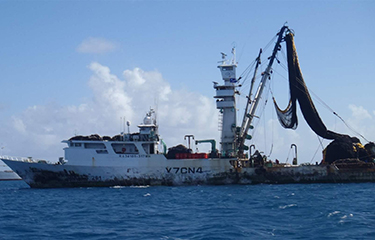Several nations that are members of the Indian Ocean Tuna Commission (IOTC) have submitted official objections that will exempt them from complying with a recently passed measure restricting the use of drifting fish-aggregating devices (dFADs).
A contentions special session of the IOTC recently passed Measure 23-02, governing the use of dFADs. Specifically, the measure would create a dFAD register with a unique identifying number for each dFAD; reduce the maximum number of instrumented dFADs from 300 to 250 on 1 January, 2024, and to 200 from 1 January 2026; and implement a 72-day dFAD closure period during which dFADs could not be deployed, fished on, or maintained.
It also requires countries to prepare management plans describing how they will reduce the capture of juvenile tuna and non-target species, how they will prevent the loss or abandonment of dFADs, and would restrict parties to only one supply-and-support vessel by 1 July, 2024.
The measure was passed on 5 February by majority vote, which is unusual for a regional fishery management organization. Since participating countries have the ability to opt out of measures they disagree with, proposals are typically adopted by unanimous agreement after reaching a consensus through compromise to ensure compliance. As a result, strong conservation measures are often watered down in the process.
Multiple countries have been fighting against stricter dFAD rules for years, and if more than a third of the commission’s 30 contracting countries object, non-objecting members will also not be bound by the measure, effectively rendering it an opt-in requirement.
The dispute highlights the weaknesses of the consensus-based governance system used by RFMOs. Avoiding such scenarios is the main reason many NGOs are pushing for harvest strategies and management strategy evaluations (MSEs). A harvest strategy is a pre-agreed framework for making fisheries management decisions, such as setting quotas, and an MSE as a tool that scientists and managers can use to simulate the workings of a fisheries system and test whether potential harvest strategies can achieve pre-agreed management objectives.
A number of RFMOs adopted harvest strategies and MSEs in 2022, however they are typically used for setting total allowable catch (TAC), while the newly passed measure at the IOTC deals with the management of dFADS.
A dFAD typically consists of a floating raft equipped with a GPS device above, and a long “tail” made of ropes or disused netting tied up below. The devices are problematic because they attract juvenile fish and bycatch species, and are responsible for entangling deaths of sharks and turtles. When abandoned or lost, they can run aground and damage coral reefs and pollute remote beaches.
An April 2022 study published in Nature Sustainability (Imzilen et al.) titled “Recovery at sea of abandoned, lost, or discarded drifting fish aggregating devices” analyzed more than 80,000 dFAD trajectories in the Indian and Atlantic oceans from 2012 to 2018, and found that more than 40 percent of dFADs ultimately drifted away from fishing grounds, becoming abandoned, lost, or discarded.
Modern dFADs are equipped with a solar-powered GPS device and a fish-finder to report their location and the amount of fish gathered under them. Support vessels manage the deployment and retrieval of the dFADs, so that fishing vessels can concentrate on fishing. Thus, a system to recover them is possible, but the companies that deploy them may find it uneconomical to retrieve dFADs that have been carried far away, or that don’t have a large enough concentration of fish to set on.
Reducing the number of dFADs and the length of the closure period have proven to be ...
Photo courtesy of The Pew Charitable Trusts








